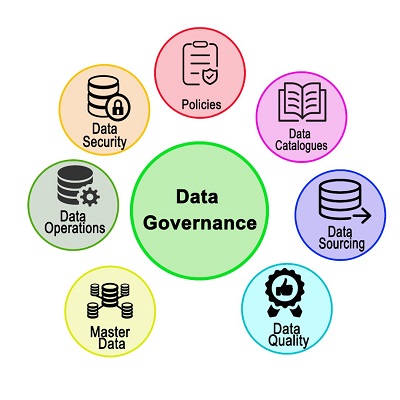We live in a modern, technological world where data, or more accurately insights from data, can...
Introduction
 Every day, we consume, produce, and modify data. Data surrounds us. Data can be a source of frustration when it is inconsistent and incomplete and leads to conflicting interpretations.
Every day, we consume, produce, and modify data. Data surrounds us. Data can be a source of frustration when it is inconsistent and incomplete and leads to conflicting interpretations.
This article looks at the importance of data governance and data literacy. It also explores how, as finance professionals, we can help to improve these domains within our businesses and what the benefits are to be gained.
What Is Data Governance?
Data governance is about the policies and procedures surrounding the management, accessibility, and usage of data within an organisation. It is about ensuring that every stakeholder in each stage of collecting, cleaning, storing, owning, and using data understands these policies and procedures. Data governance acts like an overseer of data integrity within an organisation in order to:
- Improve data quality for decision-making
- Ensure that data assets are fit for purpose
Good data governance manifests itself through improved data quality and accessibility. Improved data quality is achieved through:
- Improving the data asset’s structuredness
- Promoting a data-driven decision-making culture
- Establishing a data-literate culture
The various attributes of data have been discussed by many over the years. From a data quality perspective, I’d like to touch on two key aspects – data structure and data currency.
Data type – Structured, Unstructured and Semi-Structured
There are three types of data:
- Structured
- Unstructured
- Semi-structured
Structured data facilitates the use of
Though unstructured data is flexible and captures qualitative information (as opposed to structured quantitative data), this type of data is, by nature, more difficult for users to access and interpret. This increases the risk of misunderstanding and misinformed decision-making.
Semi-structured data may be a compromise between the two data types; however, this type of data is still open to the risk of misinterpretation and difficult access.
Data Currency
Data currency refers to the temporal aspect of the data asset. As data volume increases over time, the asset also ages and can deteriorate in relevance. Real-time data is helpful for an organisation to respond to the ever-changing environment in a timely fashion.
Take this simple example: You are going to a garden party and would like to know if you need to bring a jacket to keep warm. To make that decision, you want to consider the weather temperature. Although yesterday’s weather temperature may be useful, today’s weather temperature is more relevant. However, this is not to say that aged data is not helpful, depending on the question the business is trying to answer. The seasonal temperature of your holiday destination last year can be a helpful guide when deciding what type of clothes to take for your upcoming vacation.
Having an established data governance framework helps an organisation manage data currency. An established data governance framework helps to ensure that data is kept up to date and that aged data is not misused without due checks. From a data literacy perspective, understanding this temporary quality is crucial when using data for comparison and decision-making.
Why Is Data Governance Important?
To understand the importance of data governance, we need to understand the risks of poor data governance:
- Poor data quality
- Poor and wrong decision-making
- Increased forecast risk
- Increased percentage of unstructured data
- Fractured data sources
These risks, in turn, lead to:
- Frustration with data accessibility
- Distrust amongst stakeholders, thus creating silo operations
Everything above hampers the growth of an organisation. In some cases, these risks can lead to the downfall of a business by leaving it ill-equipped to respond to the ever-changing environment. Without good data, organisations are less capable of responding efficiently and effectively during a crisis.
Data Literacy
Gartner defines data literacy as “the ability to read, write and communicate data in context, with an understanding of the data sources and constructs, analytical methods and techniques applied, and the ability to describe the use case application and resulting business value or outcome.”
The benefits of a data-literate community are endless for the well-being and growth of an organisation. Some of these benefits include:
- Improved data-driven decision-making
- Improved understanding of the market in which the organisation operates
- Improved understanding and visibility of R&O
As an organisation becomes more data literate, its employees are better equipped to:
- Perform their functions
- Understand the decisions taken as they are data-driven and transparent
- Spot risk and opportunities
- Generate innovative ideas to mitigate risks and/or exploit opportunities
xP&A, Data Governance and Literacy
Finance professionals who conduct Extended Financial Planning and Analysis (xP&A) hold a unique position regarding data governance and ensuring a data-literate culture. It is because:
- xP&A turns data into insightful information and visuals to support data-driven decision-making
- xP&A acts as a bridge between the various functions, from HR to operations to finance
By ensuring data integrity, xP&A can use data to develop credible analyses and recommendations. Given this intimate relationship with data, xP&A professionals have a vested interest in improving the quality, consistency, accessibility, and usage of the data.
Areas in which xP&A can assist include working with stakeholders to:
- Establish a data dictionary
- Establish a master data reference
- Promote data literacy within the finance community
- Build and establish standardised and insightful reporting
- Establish a cadence for data interpretation
Conclusion
Data governance and literacy are vital parts of the digital transformation journey. Ensuring that data is structured, relevant and well understood by all is essential to a healthy data management culture. Data governance must be a priority in an organisation’s data management strategy to ensure that data is clean, consistent and properly used. Good quality data is essential for xP&A to provide value-added support to the business. And xP&A can play an important role in adding value by promoting the principles of data governance and helping to develop a data-literate finance community.
Disclaimer:
Any views or opinions expressed are solely those of the author and do not necessarily represent those of any companies for which the author has been and is working.
Subscribe to
FP&A Trends Digest

We will regularly update you on the latest trends and developments in FP&A. Take the opportunity to have articles written by finance thought leaders delivered directly to your inbox; watch compelling webinars; connect with like-minded professionals; and become a part of our global community.





